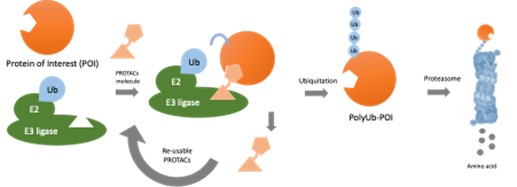The Global Health Innovative Technology (GHIT) Fund announced a total of approximately 750 million yen (US$6.6 million*) to invest in six partnerships to develop new lifesaving drugs for malaria and Chagas Disease, a vaccine for malaria, and diagnostics for tuberculosis (TB).
Selected to be funded for the amount of THB 27,471,017 (USD 838,587) is the project entitled “Identification and Validation of Potential Plasmodium E3 Ligases for PROTAC Platform” led by Dr. Nitipol Srimongkolpithak, Researcher of Frontier Biodesign and Biomolecular Engineering Research Team, BIOTEC and FIMECS, Inc., Japan.

Malaria is one of the most widespread infectious diseases in which over 200 million infections occur annually worldwide. Current antimalarial drugs do not work well against malarial parasite. Antimalarial drugs act by inhibiting a biochemical process in the parasite, for example, an enzyme target, whereas the drug must be specific to the target to prevent toxic side effects. This specificity requirement is an Achilles’ heel as drug-resistant parasites with small genetic changes that prevent the drug from binding. One solution to drug resistance is to develop new drugs against new targets. However, developing new drugs is challenging because there are few suitable drug targets. A new drug design approach is needed to expand the repertoire of antimalarial targets and the drug arsenal to exploit previously untouched vulnerabilities in the parasite. Instead of using drugs that act as inhibitors of target functions, drugs designed as protein degrader, also known as PROteolysis-TArgeting Chimeras or PROTACs, can destroy target proteins. The protein degrader work by hijacking the proteasome (a protein complex present in every cell that naturally breaks down old or damaged proteins) to degrade a target protein. Protein degraders are designed with one “warhead” that binds the target and another that binds ubiquitin E3 ligase, a protein that marks other proteins for degradation. This approach has the advantage that the protein degraders can bind anywhere on the target, without the restriction of binding to sites important for target function. Therefore, the protein degraders can be designed against proteins previously not considered as drug targets. PROTAC antimalarials acting on new targets throughout the parasite life cycle could be important tools for the eradication of malaria. However, no small-molecule PROTAC antimalarial currently exists because we lack knowledge of malaria parasite ubiquitin E3 ligases, and no chemical “warhead” is available that can recruit a parasite ubiquitin E3 ligase for hijacking the parasite’s proteasome.
The project aims to identify a chemical warhead(s) that can recruit a parasite ubiquitin E3 ligase(s) to degrade a target parasite protein, which will constitute a platform for the design of protein degrader antimalarials.
The FIMECS company (Japan) will synthesize a library of protein degraders for initial screening. The BIOTEC Institute (Thailand) will perform protein degradation experiments and the protein degrader optimization of follow-on compounds.
The Global Health Innovative Technology Fund (GHIT Fund), headquartered in Japan, is an international public-private partnership between the Government of Japan (Ministry of Foreign Affairs and Ministry of Health, Labour and Welfare), 16 leading pharmaceutical and diagnostics companies, the Wellcome Trust and United Nations Development Programme (UNDP). It funds scientific research and development for anti-infectives and diagnostics for diseases that primarily affect the developing world.
